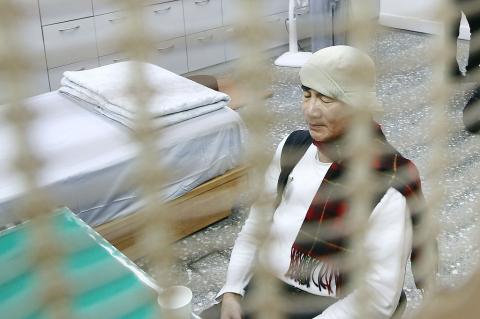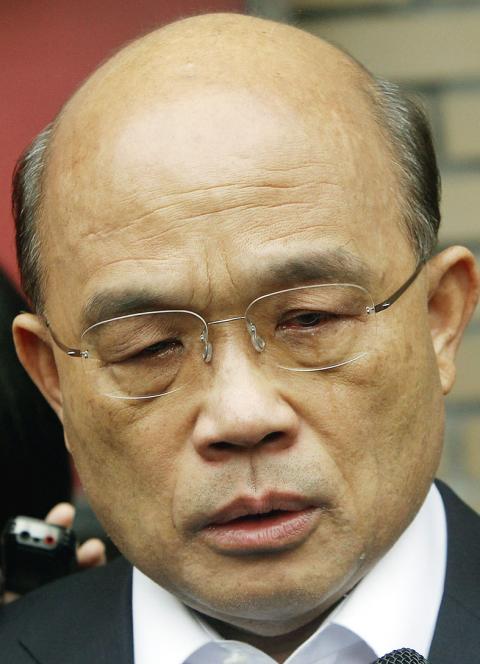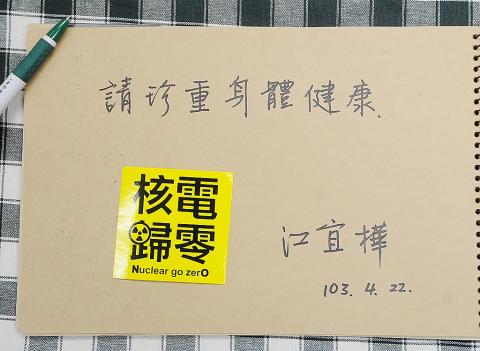Former Democratic Progressive Party (DPP) chairman Lin I-hsiung (林義雄) yesterday began a hunger strike at Taipei’s Gikong Presbyterian Church to demand that the government halt the construction of the Fourth Nuclear Power Plant in New Taipei City’s Gongliao District (貢寮), saying that the President Ma Ying-jeou (馬英九) administration’s pledge that the plant would be safe was “a trick to fool the public.”
“So-called nuclear safety is questionable because even if the plant was completed and became operational, unassailable damage could still take place in the event of a natural disaster or human error,” Lin said.
“My mind is at peace because I’m about to do something meaningful and helpful for Taiwan,” the 73-year-old said after arriving at the church at 10:55am, about an hour later than scheduled.

Photo: CNA
Lin, who announced his fasting campaign last week, is staging the hunger strike at the site of the Lin family’s former residence, where his mother and twin daughters were murdered on Feb. 28, 1980, by an unknown assailant. His eldest daughter, then nine years old, survived the attack and the Lin home was eventually converted into a church.
Lin — a well-known anti-nuclear advocate — said he appreciated his wife and daughter supporting him, despite knowing that they are doing so with “a heavy heart.”
After delivering an opening statement and conducting a 20-minute question-and-answer session with the media, Lin attended a brief prayer ceremony with friends before entering a renovated corner of the church that used to be the living room of his family residence to start the hunger strike.

Photo: Fang Pin-chao, Taipei Times
The staunch anti-nuclear advocate has vowed to neither eat, speak to nor meet visitors during his indefinite one-man protest.
Asked if he would end the hunger strike if the DPP-proposed special statute on the incomplete Gongliao station — which would lower the national referendum threshold to a simple majority and set a clear question for a plebiscite on completing the plant — was adopted, Lin said he would welcome such a development, but “it has not happened yet.”
Lin’s protest is drawing increasing attention from political figures, with DPP Chairman Su Tseng-chang (蘇貞昌) and Premier Jiang Yi-huah (江宜樺) both visiting the church.

Photo: Fang Pin-chao, Taipei Times
Su and Jiang’s visits came a day after they met on Monday to discuss the statute, but failed to reach a consensus, with the premier saying the plan was unfeasible.
Su arrived at the church at 12pm and wrote a message in a notebook prepared by church staff, saying afterward that he had been “racing against time” to resolve the issue so Lin’s hunger strike would be unnecessary, but had failed to reach an accord with the government.
“I’m not sure how many days Mr Lin will be able to sustain [the hunger strike.] After four decades of struggle [with the nuclear issue], what more can we do?” Su said as tears fell on his cheeks.
Jiang arrived about 10 minutes later to loud protests from Lin’s supporters outside the church, who chanted: “Jiang Yi-huah step down” and “Stop the construction of the Fourth Nuclear Power Plant,” and was again heckled when he left.
The premier also wrote a message to Lin in the notebook, saying: “Please take care of your health,” before leaving quickly without speaking to the media.
The Executive Yuan’s information office said Jiang was representing Ma on the visit to express the president’s concern about Lin’s health.
Given Lin’s age, his health could be at risk just two days into the fast, said National Taiwan University physician Ko Wen-je (柯文哲), who is also an independent aspirant in the Taipei mayoral election.
Former DPP chairperson Tsai Ing-wen (蔡英文) also visited Lin, arriving at the church in the afternoon and reiterating on Facebook the party’s determination to stop the construction of the Gongliao plant.
Former president Lee Teng-hui (李登輝) — a supporter of nuclear energy — yesterday said he was saddened by Lin’s protest, urging the Ma administration to “listen to the public” and work on new nuclear technology to erase people’s doubts about the project’s safety.
The Chilin Foundation, founded by Lin, and the Taiwan Rangers have organized events near the church every night starting yesterday as vigils for him. Similar activities are also planned in Taoyuan, Greater Taichung, Chiayi, Greater Tainan and Greater Kaohsiung.

CHAOS: Iranians took to the streets playing celebratory music after reports of Khamenei’s death on Saturday, while mourners also gathered in Tehran yesterday Iranian Supreme Leader Ayatollah Ali Khamenei was killed in a major attack on Iran launched by Israel and the US, throwing the future of the Islamic republic into doubt and raising the risk of regional instability. Iranian state television and the state-run IRNA news agency announced the 86-year-old’s death early yesterday. US President Donald Trump said it gave Iranians their “greatest chance” to “take back” their country. The announcements came after a joint US and Israeli aerial bombardment that targeted Iranian military and governmental sites. Trump said the “heavy and pinpoint bombing” would continue through the week or as long

TRUST: The KMT said it respected the US’ timing and considerations, and hoped it would continue to honor its commitments to helping Taiwan bolster its defenses and deterrence US President Donald Trump is delaying a multibillion-dollar arms sale to Taiwan to ensure his visit to Beijing is successful, a New York Times report said. The weapons sales package has stalled in the US Department of State, the report said, citing US officials it did not identify. The White House has told agencies not to push forward ahead of Trump’s meeting with Chinese President Xi Jinping (習近平), it said. The two last month held a phone call to discuss trade and geopolitical flashpoints ahead of the summit. Xi raised the Taiwan issue and urged the US to handle arms sales to

State-run CPC Corp, Taiwan (CPC, 台灣中油) yesterday said that it had confirmed on Saturday night with its liquefied natural gas (LNG) and crude oil suppliers that shipments are proceeding as scheduled and that domestic supplies remain unaffected. The CPC yesterday announced the gasoline and diesel prices will rise by NT$0.2 and NT$0.4 per liter, respectively, starting Monday, citing Middle East tensions and blizzards in the eastern United States. CPC also iterated it has been reducing the proportion of crude oil imports from the Middle East and diversifying its supply sources in the past few years in response to geopolitical risks, expanding

Pro-democracy media tycoon Jimmy Lai’s (黎智英) fraud conviction and prison sentence were yesterday overturned by a Hong Kong court, in a surprise legal decision that comes soon after Lai was jailed for 20 years on a separate national security charge. Judges Jeremy Poon (潘兆初), Anthea Pang (彭寶琴) and Derek Pang (彭偉昌) said in the judgement that they allowed the appeal from Lai, and another defendant in the case, to proceed, as a lower court judge had “erred.” “The Court of Appeal gave them leave to appeal against their conviction, allowed their appeals, quashed the convictions and set aside the sentences,” the judges